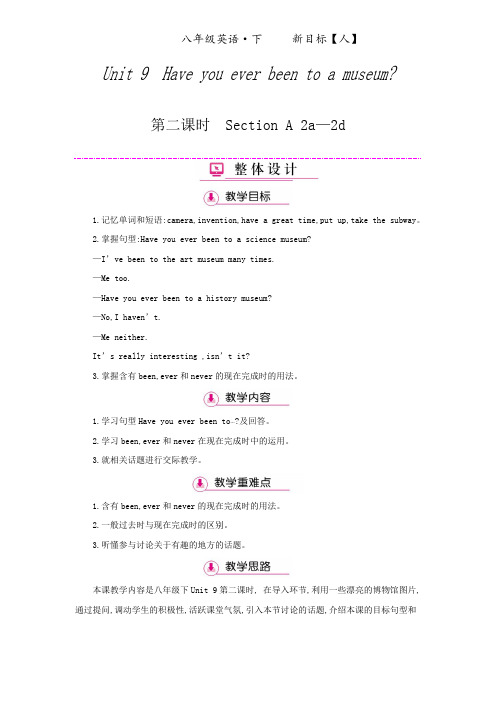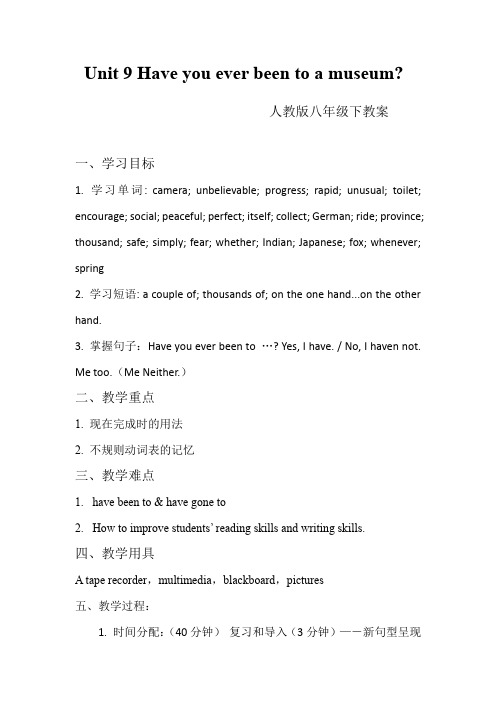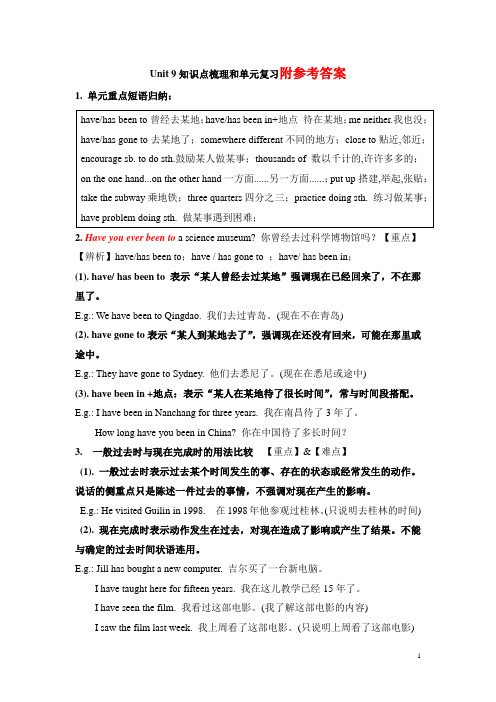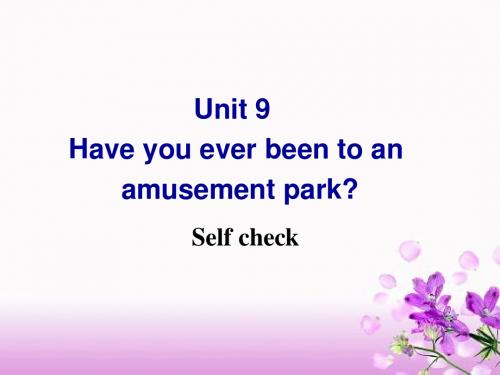初二英语(人教版)-Unit 9 Have you ever been to a museum Period 3-2PPT课件
人教版8下英语 Unit 9 Have you ever been to an amusement park Reading

animals
→ lions, tigers, foxes
seasons
→
→
summer, spring, autumn, winter
languages
Chinese, Putonghua, English
kinds of food
→
rice, noodles, dumplings, Indian/Western/Japanese food
Secti3a. Complete the word map with the words from the reading.
names of places
→
China, Singapore, Southeast Asia, zoo, Night Safari
night when they are awake. _________________________
4. It's best to visit Singapore in autumn. You can visit Singapore at any time _______________________________ of year/ in any season. ___________________
Fill in the blanks: Why is the zoo so special?
1. Singapore has a special zoo called __________________. the “Night Safari” 2. A lot of animals _________ at night, so wake up this is _____________ to watch them. the best time 3. At the zoo, you can watch lions, tigers, and
人教新目标英语八年级下册讲义—Unit 9 Have you ever been to a ……

新目标八年级下册Unit 9 Have you ever been to a museum ?讲义一、重点单词1. amusement n. 娱乐; 游戏2. somewhere adv. 在某处; 到某处3. camera n. 照相机; 摄影机; 摄像机4. invention n. 发明物5. invent v. 发明; 创造1. unbelievable adj. 难以置信的; 不真实的2. progress n. 进步; 进展3. rapid adj. 迅速的; 快速的4. unusual adj. 特别的; 不寻常的5. toilet n. 坐便器; 厕所6. encourage v. 鼓励7. social adj. 社会的8. peaceful adj. 和平的; 安宁的9. performance n. 表演; 演出10. perfect adj. 完美的; 完全的11. itself pron.(it的反身代词) 它自己12. collect v. 收集; 采集13. German adj. 德国的; 德语的; 德国人的n. 德语; 德国人14. theme n. 主题15. ride n. 供乘骑的游乐设施; 短途旅程16. province n. 省份17. simply adv. 仅仅; 只; 不过18. fear v. & n. 害怕; 惧怕19. whether conj. 不管......;还是); 或者......(或者); 是否20. Indian adj.印度的 n. 印度人21. Japanese adj.;日本的; 日本人的; 日语的n. 日本人; 日语22. equator n. 赤道23. whenever conj. 在任何......时候; 无论何时24. spring n. 春天25. mostly adv. 主要地; 通常26. location n. 地点; 位置二、短语归纳1.at night在夜晚2.in a more natural environment在一个更加自然的环境中3.all year round 全年4.be far from 离……远5.in the dark 在黑暗中6.in the past 在过去7.have been to sp. 去过某地8.science museum 科学博物馆9.history museum 历史博物馆10.amusement park 游乐园11.go somewhere different 去不同的地方12.go skating 去滑冰13.take the subway 坐地铁14.a great way to spend a Saturday afternoon一个过周六下午的好方法15.all the old movie cameras所有的古老的电影摄影机16.learn about sth.解有关……的情况17.on the weekend 在周末18.camp in the mountains 在大山里露营19.put up a tent搭帐篷20.in such a rapid way 以如此迅猛的方式21.different kinds of各种各样的22.development of toilets 厕所的发展23.social groups 社会团体24.the tea art performances茶艺表演25.make a perfect cup of tea with beautiful tea sets用漂亮的茶具沏一杯完美的茶26.a nice place to enjoy tea 一个品茶的好地方27.thousands of 数以千计的28.International Museum of Toilets国际厕所博物馆29.the Terracotta Army 兵马俑30.Southeast Asia东南亚31.Night Safari 夜间动物园32.three quarters 四分之三33.an English-speaking country一个讲英语的国家34.have problem doing sth. 做某事很困难35.during the daytime在白天36.a couple of times 好几次37.right now 现在;目前38.an amusement park with a special theme一个有特别的主题的游乐园39.walk around the park 在公园里到处走40.hear of 听说41.take a ride兜风42.another province另一个省43.the Bird’s Nest鸟巢44.encourage sb. to do sth.鼓励某人做某事45.on the one hand... on the other hand.一方面,另一方面三、句型集萃1.a great way to do sth一个做某事的好办法2.It’s unbelievable that很难相信……3.watch sb do sth.看某人做了某事4.encourage sb to do sth鼓励某人做某事5.as..as和。
人教版八年级英语下册《Unit 9 Have you ever been to an amusement park.(通用)》教案_1

八年级英语·下新目标【人】Unit 9 Have you ever been to a museum?第二课时Section A 2a—2d1.记忆单词和短语:camera,invention,have a great time,put up,take the subway。
2.掌握句型:Have you ever been to a science museum?—I’ve been to the art museum many times.—Me too.—Have you ever been to a history museum?—No,I haven’t.—Me neither.It’s really interesting ,isn’t it?3.掌握含有been,ever和never的现在完成时的用法。
1.学习句型Have you ever been to…?及回答。
2.学习been,ever和never在现在完成时中的运用。
3.就相关话题进行交际教学。
1.含有been,ever和never的现在完成时的用法。
2.一般过去时与现在完成时的区别。
3.听懂参与讨论关于有趣的地方的话题。
本课教学内容是八年级下Unit 9第二课时, 在导入环节,利用一些漂亮的博物馆图片,通过提问,调动学生的积极性,活跃课堂气氛,引入本节讨论的话题,介绍本课的目标句型和单词,在听力环节,注重对学生听力策略的指导,消除学生对听力的“恐惧”心理,让学生能够高效做题。
2d教学是本课综合运用的体现。
通过学习词组、重点句到对话的填空让学生的学习有渐进的过程;抽取学生进行角色扮演,对学生是知识升华的过程。
设计教学PPT,录音机,图片,多媒体。
StepⅠ.Lead in[设计意图]调动学生情感,激活他们头脑中关于过去去过的地方的情感,导入新授。
Leading inT:Boys and girls,do you like traveling?S:Yes.T:Great! Most of you like traveling very much.Me too.Look at the pictures.I went to a lot of places last year.Guess where I went? Use “have/has been to”.S1:You have been to Shanghai.S2:I know you have been to the space museum.S3:You have been to the amusement park.S4:You have been to the zoo.S5:…T:Great! All of you did well.I have been to so many interesting places.Which of these places would you like to visit? Please rank them 1 to 6.space museumhistory museumart museumwater parkzooamusement parkS:…[设计意图]通过情境引入,激发学生情感,便于导入新授内容。
新课标人教版八年级英语下册Unit 9 Have you ever been to an amuse

—So did Tina.
中国地图
蒂娜也去了。
—He has been a soldier for two years.
要点点拨
他已经当了两年兵了。
go inline skating 滑旱冰
—So have I.
我也是。
全析提示
3.Look at the map of the town.Listen and circle the places 助动词 have 和 has 可以与前面的
you hear.
主语缩略’ve 和’s。
看城镇的地图。听录音并圈出你听到的地方。
如:we’ve,they’ve,he’s,
water world 水上世界
it’s 等。
city library 城市图书馆
have not 常缩略为 haven’t,has
fun times amusement park
如果说“欢迎回家”该怎么说呢?
把 1a 中你的回答和你搭档的回答对照一下。
Wele back home!
4.For me,“I have to!” is number two.
对我来说“I have to!”是第二位的。
要点点拨
5.Listen to a teacher interview a student.Circle the newsletter 业务通讯;新闻信札
route“路线、小路、小巷”,使
The main attraction was a Charlie Chaplin film.
用 X 围也较小。course 表示船的
吸引人的主要是查理·卓别林的电影。
“航道”或飞机的“航线”。
The idea of being a teacher has little attraction to young
初中英语人教版八年级下册Unit 9 Have you ever been to

Period 4(Section B 1a-1d)
the Terracotta Army, Have you visited…?
Have you been to…?
the Bird’s Nest Have you seen…?
2.Do you know sth. About the foreign boy?
Now listen again and take notes. Then check answers with Ss.
3.Listen and repeat and fill in the blanks
1.Ss look through the questions in 1b first
Step 3 Task 1 Section B 1a
T:Look at the four pictures and match them with the names.
Then check with Ss.
Ss do the job then check their answers with the teacher.
Have you tried…?
2.Finish 1b
3.Finish 1c
4. Complete the rewritten passae.
1.To teach Ss to predict the answers before listening.
2.To improve Ss’ listening ability for specific information.
Have you been to…?
1.Look at the pictures and try to answer the questions.
人教版8下英语 Unit 9 Have you ever been to an amusement park

- Have you ever been to an aquarium? - Yes, I’ve been to an aquarium. No, I haven’t. No, I’ve never been to an aquarium. - I have been to the zoo a lot of times. - Me, too. - I’ve never been to a water park. - Me neither.
Example
Have been to+地点,去过某地 I ave been to beijing. 我去过北京。
★ have been to+sp. 表示去过某处,现在 已经回来了,不在那里。
We have been to Qingdao.我们去过青岛 (现在不在青岛) ★ have gone to+sp. 表示到某处,还没回 来,可能还在那里或在去的途中。
A: Have you ever been to Beijing? B: Yes,I have.
Look at this pictures
Mickey
Donald Duck
Roller coaster
过山车
Free fall
自由落体
Ferris wheel
大游览车
We should challenge ourselves! (挑战自我)
Conversation 3
Harvey had a great time at Water World. T F Harvey’s friend has never been to Water World. T F Harvey and his friend are going skating. T F
新课标人教版八年级英语下册Unit 9 Have You Ever Been to an Amuse

Unit 9 Have You Ever Been to an Amusement Park?一、学习目标:1.掌握现在完成时的用法;2.了解一般过去时、现在完成时和现在完成进行时的意义的区别;3.能够准确使用多种时态谈论自己的经历。
二、学习重点难点:1. 现在完成时由主语+have/has+过去分词构成。
其主要用法如下:I.在未指明具体时间的情况下,现在完成时动词通常可以表示在说话之前已经完成,而后果或影响至今仍存在的动作。
例如:The concert has started. 音乐会已经开始。
I have had breakfast. 我已吃过早饭。
注意:have gone to 和have been to 在意义上有区别。
例如:He has gone to Hong Kong. 他到某某去了。
(他已前往某某,或在途中,或已到达。
说话人暗示他现在不在现场。
)He has been to Hong Kong. 他曾到过某某。
(说话人认为他过去到过某某,现在已不在该地。
言外之意他对某某有所了解。
)II. 现在完成时动词可以表示开始于过去持续到现在(也许还会继续进行下去)的动作或状态。
例如:1) I have studied English since last year. 我从去年开始学习英语。
2) She has lived in Beijing for five years. 她住在已经五年了。
注意:e, go , leave, arrive, buy, lose, receive, join, die, bury 和marry 等动词所表示的动作是一时的,不能延续的,故不能与for …,since …等开头的表示一段时间的状语连用。
不过,这些词用于否定句则可以与表示持续的时间状语连用,即动作的不发生是可以持续的。
例如:不能说:*He has e to Beijing for two years.*He has bought that book for three weeks.*He has joined the Army for one and a half years.*His grandma has died for nine months.* I have received his letter for a month.可以说:He has been in Beijing for two years.He has had that book for three weeks.He has been in the army for one and a half years.His grandma has been dead for nine months.I haven't received his letter for almost a month.或者:It is two years since he came to Beijing.It is three weeks since he bought that book.It is one and a half years since he joined the Army.It is nine months since his grandma died.2. 现在完成时把过去的动作和现在的结果联系起来,一般过去时只限于表示过去的动作本身,与现在的结果无关。
英语人教版八年级下册Unit 9 Have you ever been to

Unit 9 Have you ever been to a museum?Section A (1a-1c)Ⅰ、Teaching Aims:1.Master the new words and expressions: amusement , amusement park , somewhere , water park , camera —Have you ever been to …?—Yes , I have ./ No , I haven’t.2.Learn the usage of the Present Perfect Tense .3.Learn to talk about someplace you’ve been to in English.4.To train students’listening and speaking skills and be interested in taking part in all kinds of activities in English class.Ⅱ、Teaching Key and Difficult Points:1.learn new words and expressions .2.Learn the usage of the Present Perfect Tense .3.Learn to talk about someplace you’vebeen to in English.Ⅲ、Teaching Methods:PWP method, task-based method and interactive approachⅣ、Teaching Aids:A tape recorder, multimedia and some picturesⅤ、Teaching Procedures:Step 1 Warm-upGreet the class as usual and check the homework. Step 2 Presentation1.Learn the new words:amusement , amusement park , somewhere , water pa rk , camera First,show the words on the screen and ask students to read them one by one .Then give students several minutes to read them.After that ask students to read them together. Finally,invite some students to read the words.2.Ask and AnswerLead students to have a look at the pictures and talk about them.T:Can you tell me what place this is ?Ss:It’s a space museum/ a history museum/ an amuse ment park/ a water park/ an art museum….T: Have you ever been to a space museum/ ahistory museum/ an amusement park/ a water park/an art museum…?S: Yes , I have. / No , I haven’t.T:Ok,Which of these places would you like to visit? Now open your books and turn to page 65. Look at the picture. What places can you see in the picture ?3.Teach Activity1aWhich of these places would you like to visit? Rank them from 1(most) to 6 (least).First , ask some students to read the words . Then ask Ss to work it alone. Finally , read the words together.Step 3 Practice1.Read the conversation in the picture of 1a. First , ask the students to read it aloud. Then ask two students to read it aloud.After that choose the best answer. Finally check th eir answers.Explain some language points:(1)have been to…表示某人去过某地,现在已经回来了,可用于各种人称(注意:第三人称单数用has)。
英语人教版八年级下册Unit 9 Have you ever been to

Go for it! 八(下)Unit 9 Have you ever been toan amusement park?Period 1【教案背景】以“英语新课程标准”为宗旨,适应新课程改革的需要,面向全体学生,提高学生的人文素养,增强实践能力和创新精神。
正确把握英语学科特点,积极倡导合作探究的学习方式。
培养学生积极地情感态度和正确的人生价值观,提高学生综合素质,为学生全面发展和终身发展奠定基础。
采用师生互动,倡导学生亲自体验参与,即采用任务型的教学模式,让学生在老师的指导下通过感知、体验、实践、参与和合作等方式,实现完成学习任务的目标,感受学习过程的成功;注重学生学习过程评价,促进学生发展,建立能激励学生学习兴趣和自主学习能力发展的评价体系。
【教学课题】新目标八下Unit 9 SectionA:1a,1b,1c【教材分析】本单元以谈论过去的经历为话题,主要学习现在完成时的用法。
通过丰富多彩的语言情景实践对Have/Has… ever been to…? 的句型进行充分的操练,作为第一课时要让学生正确运用Have you ever been to…?的句型及相关回答Yes, I have./No, I haven’t.本课时教材中提供的所有活动都以现在完成时态为中心,通过一系列的听、说、读、写的训练,来加深学生对现在完成时态的理解,明白英汉两种语言在结构及表达方法的一些异同点。
从而提高他们运用所学语言的综合能力。
学生已经在在Go for it! 8下U-8过现在完成进行时态,因而对现在完成时态并不陌生。
通过对学生们喜闻乐见的一些娱乐场所(fun places)的描述,反复运用句型Have you ever been to…? I’ve never been to…. 来激发他们使用本单元所学单词的兴趣。
【教学方法】1、师生互动、生生互动教学法;2、图片采用PPT课件展示;3、课文录音采用MP3音频播放;4、作业采用学生人手一份纸质作业和大屏幕课件展示答案的方法;5、学生课堂活动评价采用个人得小礼品竞赛的方法。
人教版英语八下U9Have you ever been to a museum 讲义

Unit9 Have you ever been to a museum?一、重点词汇及拓展1. amusement n. 娱乐;游戏e.g. The old ladies played the games just for amusement.老太太们玩这个游戏只是为了取乐。
amuse v. 消遣,逗笑;使开心,使愉快amusing adj. 有趣的,好玩的,好笑的amused adj. 被逗乐的;感到好笑的2.amusement park 游乐场e.g. The amusement park is open from May through October.游乐园从五月到十月开放。
3.somewhere adv. 在何处;到某处pron. 某个地方e.g. Maybe the keys are somewhere in the dining room.也许钥匙在餐厅某个地方。
I need to find somewhere to stay tonight.我得找到今晚要住的地方。
4.camera n.照相机;摄影机;摄像机e.g. I heard your parents bought you a cameras as a gift.我听说你的父母亲给你买了一台照相机作为礼物。
5.invention n.发明;发明物e.g. Do you think mobile phone is a great invention?你认为手机是一个伟大的发明吗?6.invent v.发明;创造inventor n.发明家invention n.发明;发明物e.g. As we all know that Edison invented light bulb.我们都知道爱迪生发明了灯泡。
7. unbelievable adj. 难以置信的;不真实的unbelievably adv. 难以置信地;不真实地unbelievably bad/good 坏得/好得令人难以置信incredible adj. 难以置信的e.g. I still find this story both fascinating and unbelievable.我仍然觉得这个故事非常有趣和难以置信。
初中英语人教版八年级下册Unit 9 Have you ever been to

Unit 9 Have you ever been to a museum?人教版八年级下教案一、学习目标1. 学习单词: camera; unbelievable; progress; rapid; unusual; toilet; encourage; social; peaceful; perfect; itself; collect; German; ride; province; thousand; safe; simply; fear; whether; Indian; Japanese; fox; whenever; spring2. 学习短语: a couple of; thousands of; on the one hand...on the other hand.3. 掌握句子:Have you ever been to …? Yes, I have. / No, I haven not. Me too.(Me Neither.)二、教学重点1. 现在完成时的用法2. 不规则动词表的记忆三、教学难点1. have been to & have gone to2. How to improve students’ reading skills and writing skills.四、教学用具A tape recorder,multimedia,blackboard,pictures五、教学过程:1. 时间分配:(40分钟)复习和导入(3分钟)—-新句型呈现(5分钟)——句型练习(15分钟)—-任务应用(8分钟)--小结(2分钟)——书写练习(6分钟)——作业布置(1分钟)2. 教学过程依据:⑴遵循人类认识过程的普遍规律和学生认识活动的特点:⑵教师为主导,学生为主体。
3. 分步设计:Step1复习和导入:(3分钟)播放迪斯尼音乐Let’s play. 用已学过的句型进行口语热身练习。
人教版八年级英语下册教案Unit 9 Have you ever been to a museum.

Unit 9Have you ever been to a museum?本单元教材以“曾经去过某地”为中心话题,围绕着“现在完成时态的教学”进行,学习和运用几个常见的句型:—Have you ever been to a science museum?—Yes,I have.I went tothe National Science Museum last year./—I have never been camping.—Me neither./It also encourages governments and social groups to think about ways to improve toilets in the future./—I have been to the art museum many times.—Me,too.And I have also visited the nature museum.等。
在学习过程中,学生在交流中,能促进师生之间的感情。
Section A主要学习几个常见的动词短语及句型Have you been to…?应掌握句型:—Have you ever been to a science museum?—Yes,I have.I went to the National Science Museum last year.等。
通过一篇短文介绍了学生们曾经去过的最有趣的博物馆,增加了学生的阅读量。
Section B安排了听、说、读、写的任务,通过短文“Singapore—A Place You Will Never Forget!”介绍了新加坡的一些情况。
教师在教学中应合理利用课本上的知识进行教学。
第一课时Section A(1a-2d)Teaching Key Points【教学重点】The vocabulary:amusement,somewhere,camera,invention,history/space/art museum,put up,have a good time,water/amusement parkTarget language:1.—Have you ever been to a science museum?—Yes,I have.I went to the National Science Museum last year.2.I have never been camping.3.It's a great way to spend a Saturday afternoon.Teaching Difficult Points【教学难点】Use the target language above to talk about past experiences.Teaching Aids【教学工具】an English book,a tape recorder and CAITeaching Steps【教学过程】★Step 1Preview and perception【预习感知】Ask the students to read the vocabulary and target language.Ⅰ.英译汉。
人教版 八年级英语 下册 Unit_9_Have_you_ever_been_to_a_museum

dish.
Tapescripts:
Boy 1: So, Peter, how long have you been in China? Peter: I’ve been here for two weeks, but I’m going back to Australia tomorrow. Boy 1: Have you traveled much? Peter: Yes, I have. I’ve seen many interesting things. Boy 1: Have you visited the Palace Museum? Peter: Yes, I have. I went there last week. It was wonderful. There were so many beautiful treasures. Boy 1: And have you been to the Great Wall?
1st listening
1b
Listen to a student interviewing a foreign student. Check (√) the questions you hear.
___√_ Have you visited the Palace Museum?
___√_ Have you been to the Great Wall?
人教版八年级英语下册Unit9 Have you ever been to a museum知识点梳理及单元复习

Unit 9知识点梳理和单元复习附参考答案1. 单元重点短语归纳:have/has been to曾经去某地;have/has been in+地点待在某地;me neither.我也没;have/has gone to去某地了;somewhere different不同的地方;close to贴近,邻近;encourage sb. to do sth.鼓励某人做某事;thousands of 数以千计的,许许多多的;on the one hand...on the other hand一方面......另一方面......;put up搭建,举起,张贴;take the subway乘地铁;three quarters四分之三;practice doing sth. 练习做某事;have problem doing sth. 做某事遇到困难;2. Have you ever been to a science museum? 你曾经去过科学博物馆吗?【重点】【辨析】have/has been to;have / has gone to ;have/ has been in;(1). have/ has been to 表示“某人曾经去过某地”强调现在已经回来了,不在那里了。
E.g.: We have been to Qingdao. 我们去过青岛。
(现在不在青岛)(2). have gone to表示“某人到某地去了”,强调现在还没有回来,可能在那里或途中。
E.g.: They have gone to Sydney. 他们去悉尼了。
(现在在悉尼或途中)(3). have been in +地点:表示“某人在某地待了很长时间”,常与时间段搭配。
E.g.: I have been in Nanchang for three years. 我在南昌待了3年了。
How long have you been in China? 你在中国待了多长时间?3. 一般过去时与现在完成时的用法比较【重点】&【难点】(1). 一般过去时表示过去某个时间发生的事、存在的状态或经常发生的动作。
人教版8下英语 Unit 9 Have you ever been to an amusement park Reading (3)

4. Have you decidedwhat you want to do after school? _______
traveled 5. He is a tour guide. He has ________ all over Europe.
2. Interview three students. Complete the chart.
Homework
写作训练
星期天你觉得无聊,请与Tingting商 量怎么出去玩,到哪儿去,就此用英 语编写一段对话。
A Sample
A: Tingting,do you have something interesting to do? B: The soap opera is quite funny. A: I don' t think so. I want to go out for a walk. B: Have you ever been to the space museum? A: Yes. I went there twice. I don' t want to go there B: Then let' s go to an aquarium. It' s funny.
11. —Don’ t throw paper on the ground, please. B —______. A. It doesn’ t matter B. I’ m sorry C. Excuse me D. That’ s all right D 12. Would you mind ______ the stereo? I can’ t hear what he is saying. A. turn off B. turn down C. turning off D. turning down D 13. I can’t hear you clearly. Please ______ the radio a little. A. turn off B. turn on C. turn to D. turn down
英语人教版八年级下册Unit 9 Have you ever been to ..语法详解

Yes, I have. I've already finished reading it. It was really good.
1. 现在完成时动词构成 have /has + v 过去分词 否定 助动词 haven’t hasn’t
Have you…? 疑问 Has he…? 常与下列时间状语连用:just , already, yet, ever, never, before, several times
结构: 主语+ have / has + 动词的过去分词 一般疑问句: have / has … ? Yes, I have. No, I haven’t. Yes, she has. No, she hasn’t.
years
years
ago(过去)
结束
now
(至少到现在)
现在完成时
Studied English two years ago have breakfast past I’m I still not study hungry now no now
。
关键
关键
1
一定要会识别时间
常见的时间 for + 段时间 already yet ever before
I have lived here for three years. I have lived here since 2004/three years ago.
动词构成:have/has+v过去分词
现在完成时:
表示过去发生或已经完成的某一动作对现在造
成的影响或结果,或从过去开始一直延续到现在的
动作或保存的状态。
since + 点 时间 so far ever since never just then
英语八年级下册 Unit9 Have you ever been to a museum单元短语过关

人教版英语八年级下册第九单元短语过关Unit 9 Have you ever been to a museum?1. a science museum 一个科学博物馆2. a space museum 一个太空博物馆3. a history museum 一个历史博物馆4.an art museum 一个艺术博物馆5.water park 水上乐园6.amusement park 游乐场7.somewhere different 某个不同的地方;不定副词,后接形容词;例如:For my next vacation , I ‘d like to go somewhere different. 下次度假,我想去个不同的地方。
st year 去年9.at night在夜晚;at noon在中午10.have \ has been to ... 去过...;例如:I have been to a wonderful placewith big gardens. 我去过一个带有很多花园的美景之地。
have \ has gone to ... 去了;例如:She can’t find Mr. Green , he has gone to Beijing. 她不能找到格林先生,他去了北京。
11.go skating 去滑冰12.take the subway 乘坐地铁13.camp in the mountains 在山上野营;例如:During the summervacation , we camped in the mountains and it was fun. 暑假期间,我们在山上野营,非常有趣。
14.put up the tent 搭建帐篷;put up 还可以表示张贴;例如:They putup their tent and slept under the tree.他们搭建好帐篷,在树下睡了。
人教版新目标英语八年级下册:Unit 9《Have you ever been to a museum》知识点梳理及单元复习

Unit 9知识点梳理和单元复习附参考答案1. 单元重点短语归纳:2. Have you ever been to a science museum? 你曾经去过科学博物馆吗?【重点】【辨析】have/has been to;have / has gone to ;have/ has been in;(1). have/ has been to 表示“某人曾经去过某地”强调现在已经回来了,不在那里了。
E.g.: We have been to Qingdao. 我们去过青岛。
(现在不在青岛)(2). have gone to表示“某人到某地去了”,强调现在还没有回来,可能在那里或途中。
E.g.: They have gone to Sydney. 他们去悉尼了。
(现在在悉尼或途中)(3). have been in +地点:表示“某人在某地待了很长时间”,常与时间段搭配。
E.g.: I have been in Nanchang for three years. 我在南昌待了3年了。
How long have you been in China? 你在中国待了多长时间?3. 一般过去时与现在完成时的用法比较【重点】&【难点】(1). 一般过去时表示过去某个时间发生的事、存在的状态或经常发生的动作。
说话的侧重点只是陈述一件过去的事情,不强调对现在产生的影响。
E.g.: He visited Guilin in 1998. 在1998年他参观过桂林。
(只说明去桂林的时间)(2). 现在完成时表示动作发生在过去,对现在造成了影响或产生了结果。
不能与确定的过去时间状语连用。
E.g.: Jill has bought a new computer. 吉尔买了一台新电脑。
I have taught here for fifteen years. 我在这儿教学已经15年了。
I have seen the film. 我看过这部电影。
- 1、下载文档前请自行甄别文档内容的完整性,平台不提供额外的编辑、内容补充、找答案等附加服务。
- 2、"仅部分预览"的文档,不可在线预览部分如存在完整性等问题,可反馈申请退款(可完整预览的文档不适用该条件!)。
- 3、如文档侵犯您的权益,请联系客服反馈,我们会尽快为您处理(人工客服工作时间:9:00-18:30)。
A
B
C
D
Your notes (words): food, rice, noodles, dumplings, Western food
Listen, choose the picture and take notes.
A
B
C
D
Your notes (words): zoo, night, lions, tigers, natural environment
Your notes (sentences): If you go to see lions, tigers or foxes during the daytime, they’ll probably be asleep. At the Night Safari, you watch animals in a natural environment.
Your notes (sentences): The temperature is almost the same all year round because this island is close to the equator. You can choose to go whenever you like and it is not too far from China.
The title tells us Singapore is a place people will never forget after visiting there and the picture tells us that there is a zoo in Singapore which is different from those in other places. The passage introduces Singapore is a place worth visiting.
Listen, choose the picture and take notes.
A
B
C
D
Your notes (words): temperature, same, close, spring, far from
Listen, read and write.
Read Paragraph One, take notes and write the main idea.
Unit 9 Have you ever been to a museum?
Period 3 初二年级 英语
Your goals
By the end of this period, you will be able to 1. make notes to help remember things better; 2. introduce a place you have ever been to orally; 3. write a simple article to introduce a place.
A guessing game
Do you know where it is?
It is a very beautiful city. It is also a country on a small island. It lies in Southeast Asia. Thousands of tourists go there every year to take a holiday.
Listen, choose the picture and take notes.
A
B
C
D
Your notes (words): tourists, islandБайду номын сангаас holiday, Putonghua, English-speaking
Listen, choose the picture and take notes.
The main idea: The Night Safari in Singapore (going to the zoo at night).
Listen, read and write.
Read Paragraph Four, take notes and write the main idea.
It is Singapore.
Brainstorm
What do you know about Singapore?
food
language
weather
Singapore
location
places of
…
interest
Predict the main idea!
Can you predict what the passage is about by reading the title and picture? Singapore — A place you will never forget!
Your notes (sentences): Thousands of tourists come to Singapore. It is a small island in Southeast Asia. Most people there are Chinese, so you can speak Putonghua there.
The main idea: The food in Singapore (Chinese food & food from other countries).
Listen, read and write.
Read Paragraph Three, take notes and write the main idea.
The main idea: The general introduction to Singapore (location & language).
Listen, read and write.
Read Paragraph Two, take notes and write the main idea.
Your notes (sentences): In Singapore, you can find a lot of Chinese food such as rice, noodles and dumplings. Singapore is a good place to try new food, such as Indian food and Western food.
